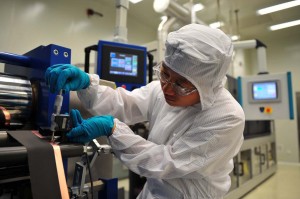General Motors China has opened an advanced development center in Shanghai where researchers and engineers will work on the development of next-generation vehicle battery systems.
The decision is no coincidence. With its endemic smog problems, China has set strict new mandates for the use of electric propulsion and could become the leader, many experts believe, in the development of battery technology.
“Producing the first prototype battery cells is a big step forward for the GM China Advanced Technical Center. It is critical for enabling GM to develop smaller, lighter and lower-cost new-generation batteries,” said John Du, director of GM China’s China Science Lab.
“Leveraging this success, the independent assessment system for battery materials will help speed up technical progress,” he said.
Du said researchers in Shanghai will be able to complete a series of processes, including battery material preparation, battery material coating, battery cell fabrication and battery cell performance testing.
The GM China Advanced Technical Center recently produced its first batch of battery cells using state-of-the-art fabrication methods, an important milestone in the establishment of its battery material assessment capability.
Over time, battery cells and supporting systems are expected to become more affordable for GM customers around the world and help GM expand vehicle electrification.
The expanded capability in China will also pave the way for GM to build strategic partnerships with battery cell and cell material suppliers, and make purchasing decisions as a “smart cell buyer,” GM said in its announcement.
GM’s goal is to accelerate the development of batteries with improved energy density, allowing smaller overall system sizes and reducing costs. This, in turn, will help improve the affordability of plug-in vehicles for consumers.
The battery cell is a fundamental technology in determining the performance of plug-in vehicles.
The battery system includes the components needed to control cell temperature, manage battery charge and discharge, and package cells in vehicles. The materials of which battery cells are made are decisive in determining the cost, durability and reliability of the entire battery system.
GM’s announcement could draw some criticism from right-wing politicians and media in the U.S. concerned about the idea of the automaker, bailed out by taxpayer funding, supporting China’s effort to take a lead in battery technology.
There’s already something of a backlash to news that the Chinese may take up to an 80% stake in U.S. battery maker A123, which received a low-interest Dept. of Energy loan.


Can you blame them for taking this to China? Over there the Chinese government is for clean, green energy while over here the Republicans will fight them tooth and nail because they want to protect their friend in the oil, gas and coal businesses because they’re the ones with the deep pockets that donate millions to the Republican party.